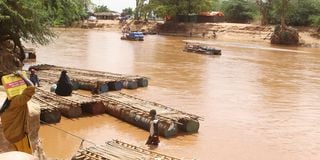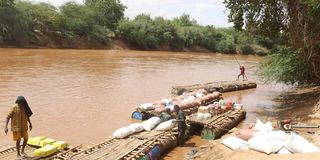Premium
Suftu, an Ethiopian town where Kenyans go to unwind

Rafts in River Daua along the Kenya-Ethiopia border on July 24. Kenyans throng Suftu over the weekends to unwind at lower cost than in Mandera town.
About one and a half kilometres from the Kenya-Ethiopia border in Mandera town lies Suftu, a town known more among Kenyans than Ethiopians.
Ask anyone in Mandera about this town and her story will be narrated to you without hesitation.
Sometime back, before Somalia fell into the hands of organised gangs, including Al-Shabaab militants, Bulahawa was the most vibrant town among the three.
Bulahawa is in Somalia but is conjoined to Mandera town.
Visitors confused
Suftu in Ethiopia, Mandera in Kenya and Bulahawa in Somalia have remained related in a peculiar manner that leaves visitors confused.
If you visit Mandera today, you will freely enter Suftu, but your attempts to cross into Bulahawa will land you in police cells.
Security agencies here have always suspected that anyone new in Mandera who is seeking to cross into Bulahawa is an Al-Shabaab recruit leaving to join the group in Somalia.
Because of security challenges at the Kenya-Somalia border, Kenyans switched their “allegiance” to Ethiopia’s Suftu.
“In the early 90s, people used to cross into Bulahawa to unwind but things have since changed due insecurity posed by Al-Shabaab,” said Mr Hassan Alio, a resident of Mandera.
Rafts to cross river
To get to Suftu, you must cross River Daua, which forms the border between Kenya and Ethiopia.
Rafts are available to carry you across the river, which flows nine months of the year and is dry the rest of the time.
You will pay Sh50 to cross the river and then security agencies on the Ethiopian side will frisk you properly before letting you go.
“The frisk is about ensuring nobody is carrying anything dangerous to harm revellers at Suftu town. We cannot trust anyone, especially those coming from Kenya,” a security officer in Ethiopia said.
No weapons allowed
Sometime in 2016, a police officer from the Mandera Police Station crossed with a hand grenade into Suftu, leading to the arrest of more than 200 Kenyans who were enjoying themselves.
“We don’t allow any weapons into Suftu. People have to come with their identity cards alone,” the security officer said.
After crossing the river, one can decide to jump into a taxi from the riverbank into the town or just walk there.
As you get closer to Suftu, a mix of music, mostly by Kenyan artistes, welcomes you and the closer you get, the louder the music.
Makeshift bars
There are more than 10 makeshift bars in this town.
Beer is cheap in these bars, according to revellers who visit frequently.
Here, you will dance to ohangala, mugithi, rhumba and Tanzania's bongo flava.
“We buy beer here for Sh100, unlike back at home where the cheapest beer is Sh200,” said Tonny Omondi, a patron.
Many Kenyans, he said, cross into Suftu because finding beer or any other form of alcohol in Mandera is not easy.
He lamented that there are no bars in Mandera town where one can freely go to unwind after a long day at work.
“We are limited here in Mandera town. There are no bars and if you want good alcohol you have to go to the security camps, where again you have no freedom,” he lamented.
The only bar in Mandera, christened Animal Farm, was demolished by a local and the land grabbed, according to residents.
Ethiopian women
Mr Omondi said the women factor also attracts many Kenyans to Ethiopia on weekends.
“It will only cost you Sh1,000 to have a good time with a woman here in Suftu, unlike in Mandera where getting a woman is not that easy due to the religion and culture,” he said.
The woman gets Sh700 while Sh300 goes to the lodging management.
A majority of patrons here are Kenyans working in the informal sector, like miners in quarries and construction workers.
Kenyan soldiers, police officers and government officials are also among the patrons.
“It is common for security vehicles to drop officers here to cross into Suftu and in the evening the same vehicles will come back to pick up the drunk officers to take them back to the camps,” said Ms Halima Ali, a miraa dealer at the border.

Traders use rafts in River Daua along the Kenya-Ethiopia border to transport goods. Business in Suftu, which is in Ethiopia, is transacted in Kenyan currency.
Kenyan currency
Business here is transacted in Kenyan currency and locals say they like it that way because they are more attached to Kenya than Ethiopia.
“We get almost everything from Kenya, starting with foodstuff to other goods in our shops, but we observe our country’s law,” said Mr Dani Kassa, a businessman in Suftu.
Mr Kassa said most Kenyans cross into Suftu for leisure.
“Despite an increase in prostitution and other social vices, our people are getting money from these Kenyans because we sell to them other things while they are here for leisure,” he said.
Mr Andrew Wekesa, a teacher in Mandera town, said he has always crossed into Suftu in search of a drink.
“Alcohol is cheap in Suftu and you have the real life of a club while there unlike in Mandera where you drink in a police camp then while getting out they arrest you and charge you with being drunk and disorderly,” he said.
One hundred Ethiopian birr are equal to Sh150 and revellers are happy with this.
Mr Wekesa said good security arrangements in Suftu encouraged him to keep going there.
“You only need to leave your identity card with the security officers at the riverbank and proceed to enjoy yourself,” he said, adding that shisha smoking attracts more women from Kenya into Suftu.
It is an unwritten law that you should never be in Suftu beyond 4pm.





